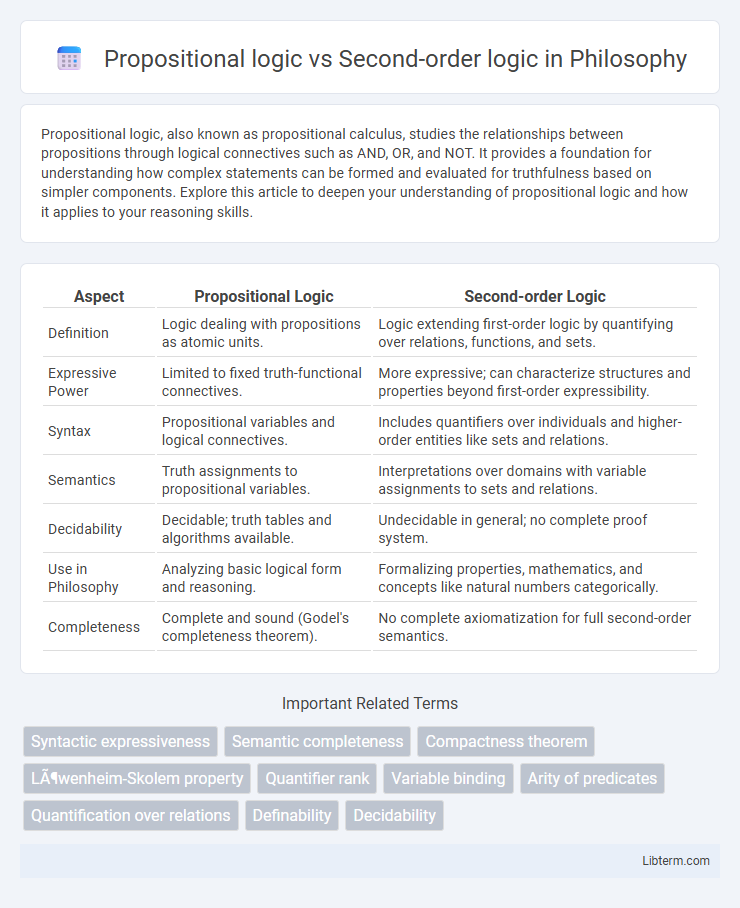Propositional logic, also known as propositional calculus, studies the relationships between propositions through logical connectives such as AND, OR, and NOT. It provides a foundation for understanding how complex statements can be formed and evaluated for truthfulness based on simpler components. Explore this article to deepen your understanding of propositional logic and how it applies to your reasoning skills.
Table of Comparison
| Aspect | Propositional Logic | Second-order Logic |
|---|---|---|
| Definition | Logic dealing with propositions as atomic units. | Logic extending first-order logic by quantifying over relations, functions, and sets. |
| Expressive Power | Limited to fixed truth-functional connectives. | More expressive; can characterize structures and properties beyond first-order expressibility. |
| Syntax | Propositional variables and logical connectives. | Includes quantifiers over individuals and higher-order entities like sets and relations. |
| Semantics | Truth assignments to propositional variables. | Interpretations over domains with variable assignments to sets and relations. |
| Decidability | Decidable; truth tables and algorithms available. | Undecidable in general; no complete proof system. |
| Use in Philosophy | Analyzing basic logical form and reasoning. | Formalizing properties, mathematics, and concepts like natural numbers categorically. |
| Completeness | Complete and sound (Godel's completeness theorem). | No complete axiomatization for full second-order semantics. |
Introduction to Propositional and Second-Order Logic
Propositional logic, also known as sentential logic, deals with propositions as whole units and evaluates their truth values using logical connectives like AND, OR, and NOT. Second-order logic extends first-order logic by allowing quantification not only over individual variables but also over predicates and relations, enabling more expressive statements about properties and sets. While propositional logic is decidable and has simpler syntax, second-order logic is significantly more powerful but often undecidable, making it essential for advanced formal reasoning and mathematical foundations.
Fundamental Concepts of Propositional Logic
Propositional logic operates with simple, declarative propositions that are either true or false, forming the basis for logical operators such as AND, OR, and NOT. Its fundamental concepts include truth values, logical connectives, and truth tables, enabling the evaluation of compound statements without quantifiers. Unlike second-order logic, propositional logic lacks the capacity to quantify over predicates or sets, limiting its expressive power but providing computational simplicity.
Key Features of Second-Order Logic
Second-order logic extends propositional logic by allowing quantification over relations, functions, and sets, not just individual variables, enabling the expression of more complex properties and richer semantics. It supports higher expressiveness through the ability to specify concepts like transitivity, connectivity, and completeness, which are inexpressible in propositional logic. Although this expressiveness comes at a cost of undecidability and increased complexity, second-order logic provides powerful tools for formal verification, mathematical reasoning, and knowledge representation.
Expressive Power: Comparing Both Logics
Propositional logic offers limited expressive power, dealing only with truth values of atomic propositions and their combinations through logical connectives. Second-order logic significantly enhances expressive power by quantifying over sets, relations, and functions, enabling representation of properties and structures that propositional logic cannot capture. This increased expressiveness allows second-order logic to formalize concepts like natural number induction and graph connectivity, which are beyond the scope of propositional logic.
Syntax Differences: Propositional vs Second-Order
Propositional logic syntax consists of atomic propositions combined using logical connectives like AND, OR, and NOT, without variables or quantifiers. Second-order logic syntax extends first-order logic by including quantification not only over individual variables but also over predicate and function variables, allowing expressions about properties and relations. This added layer of quantification in second-order logic dramatically increases expressive power and complexity compared to the simpler propositional logic framework.
Semantics and Interpretation
Propositional logic interprets sentences as true or false values without consideration of internal structure, focusing on truth assignments to atomic propositions within a fixed domain. Second-order logic extends this by quantifying over relations, functions, and sets, enabling more expressive semantics that capture properties and structures beyond mere truth values. The interpretation in second-order logic involves higher-order domains, making its semantic framework richer but also more complex and less decidable compared to propositional logic.
Decidability and Undecidability
Propositional logic is decidable, meaning there exists a systematic procedure to determine the truth or falsity of any formula within finite time, often through truth tables or SAT solvers. In contrast, second-order logic is generally undecidable because it allows quantification over sets or relations, leading to an expressive power that surpasses algorithmic solvability. This undecidability makes second-order logic unsuitable for automated reasoning tasks that require guaranteed termination.
Applications in Computer Science and Mathematics
Propositional logic serves as the foundation for digital circuit design and automated theorem proving, utilizing boolean variables to represent simple true/false statements. Second-order logic extends expressiveness by quantifying over relations and functions, enabling formalization of complex mathematical theories such as set theory and arithmetic. In computer science, second-order logic supports advanced areas like program verification and type theory, offering richer specification capabilities beyond propositional logic's scope.
Advantages and Limitations of Each Logic
Propositional logic offers simplicity and decidability, making it efficient for automated theorem proving and digital circuit design but is limited by its inability to express relationships between objects or quantify variables. Second-order logic extends expressiveness by allowing quantification over predicates and relations, enabling more powerful formalizations of mathematics and computer science concepts, though it sacrifices completeness and decidability, making automated reasoning far more complex. The trade-off between the computational tractability of propositional logic and the expressive power of second-order logic determines their suitability for different applications in logic and formal verification.
Summary and Conclusion
Propositional logic operates with simple, declarative variables and truth-functional connectives, making it decidable but limited in expressiveness. Second-order logic extends propositional logic by allowing quantification over predicates and sets, increasing expressiveness at the cost of undecidability and greater complexity. While propositional logic is suitable for automated reasoning tasks requiring efficiency, second-order logic is essential for formalizing more complex mathematical and philosophical concepts.
Propositional logic Infographic

 libterm.com
libterm.com